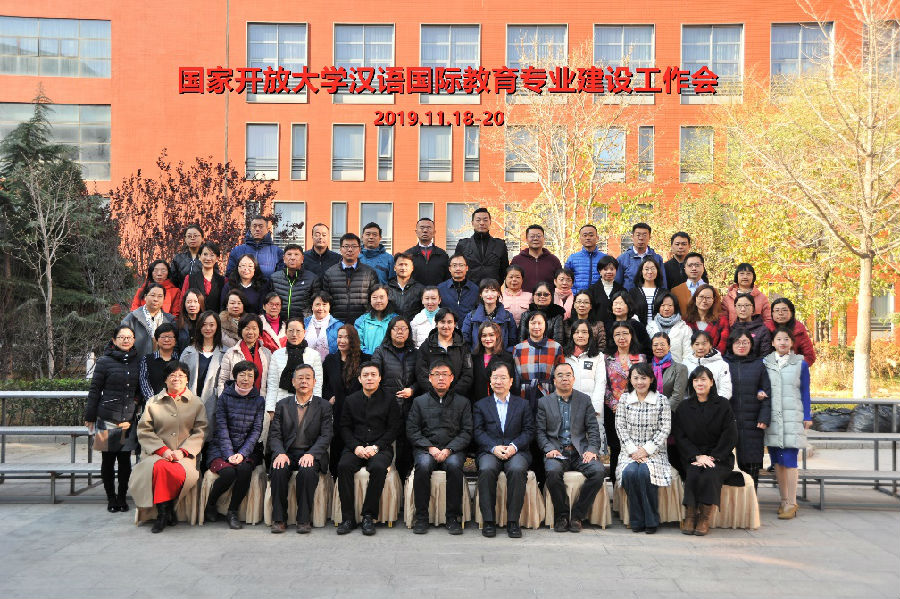 With the sustained and rapid development of China's economy and society, and the implementation of the Belt and Road Initiative, a dramatically increasing number of people are learning Chinese as a second language throughout the world and as such, there is a greater need for more Chinese language teachers.
With the sustained and rapid development of China's economy and society, and the implementation of the Belt and Road Initiative, a dramatically increasing number of people are learning Chinese as a second language throughout the world and as such, there is a greater need for more Chinese language teachers.

With this is mind, the Open University of China (OUC) will launch the International Chinese Language Education major in the spring semester of 2020, aiming to train professionals engaged in the teaching of the international Chinese language and the promotion of Chinese language and culture. In order to rally the strength of the system and promote the enrolment and teaching of the major, the OUC Faculty of International Languages and Cultures organised a conference on the construction of the International Chinese Language Education major in Beijing from 18-20 November 2019. A total of 57 people from 30 branches and two experimental schools were present, including leaders, teaching management personnel, and teachers.
OUC vice president Lin Yu attended the conference and pointed out that the OUC should place the focus of its educational operation on “open education.” He made a further analysis of the meaning of open education from the four aspects of “what it is”, “what is going on”, “what to do”, and “how to do it.” He underlined that open education should be oriented towards the whole of society and help to develop human resources for society. By leveraging the strengths of online education and artificial intelligence, the OUC should provide learners with practical and applicable curriculum resources, as well as reasonable evaluation and a guarantee that they will deliver convenient and flexible teaching services. In terms of enrolment, consideration should be given to how to locate target students in the market. In order to polish the OUC brand, it is necessary to put in place “governance of enrolment, examination, and learning,” to supervise teaching, management, and learning behaviours by means of modern information technology, and to strengthen the management of grassroots teaching units so as to detail and implement teaching inspections. On the other hand, it is also necessary to deepen teaching reform and improve the connections between courses to enhance their support for each other.
Ye Zhihong, director of the Academic Affairs Department, talked about the construction of majors from the perspectives of “understanding demands,” “creating different levels,” “strengthening disciplines,” and “increasing internationalisation.” He said that it was necessary to improve the level and quality of school-running while also expanding scale to realise orderly growth. The key to quality improvement lies in strengthening discipline construction in order to upgrade the school-running level and move towards internationalisation based on the actual needs of society. When setting up teaching teams and implementing teaching, it is necessary to outline the positioning of teacher's roles and the transformation of their functions. In order to shape the OUC’s International Chinese Language Education into a model major, the construction of the discipline must be strengthened.
Professor Wu Yinghui, a senior expert in international Chinese language education from Beijing Language and Culture University, was also invited to give a lecture entitled “Opportunities and challenges in the Global Chinese Language Education Industry.” Professor Wu conducted an in-depth analysis of the development situation of the global Chinese language education industry and indicated that open universities are facing unprecedented opportunities in the development of international Chinese language education. With the recent changes to the domestic and international situation, there is every possibility for Chinese to become a global language. Against this background, the OUC should leverage the strength of distance education and the pairing of “Internet + artificial intelligence” to consider important such as how to further integrate information technology and artificial intelligence with Chinese language education, how to make students the centre of the operation model, how to adapt teaching resources to social needs, and how to encourage industries to cooperate with Chinese language education societies.
During the conference, the Faculty of International Languages and Cultures reported on the construction of the international Chinese language education major from the perspectives of “jobs already being carried forward,” “training programme,” “curriculum resources,” and “teaching team.” President and deputy secretary Liu Jianguo from the Party Committee of the Harbin Branch and director Song Feng from the Faculty of Arts and Law of the Xi 'an Branch shared the practical experiences of their own branches in international Chinese language education. Through the introduction and sharing of the work of the headquarters and the branches, the attendants saw that many practical achievements have already been made in international Chinese language education within the open university system and that offer the major is both a response to social development needs and a development based on competent experience.
The teachers present at the conference held lively discussions on issues such as enrolment, learner development, and teaching team construction within international Chinese language education. It was agreed that full consideration should be given to the learning needs of groups with different backgrounds, so as to clearly define segmented markets of potential students for the international Chinese language education major. Through the discussions, the attendants came to understand the current progress of curriculum resource construction and suggested that the construction and sharing of course resources be realised by encouraging the teachers inside the system to join in the course teaching team. In terms of learner development, the attendants gave suggestions for employment solutions, training methods, and the connection of professional certificates.
The conference brought together the strength of the OUC system and played a role in promoting joint efforts to successfully operate the International Chinese Language Education major supported by distance education.

Written by Zhu Lu and photographed by Wang Li, OUC